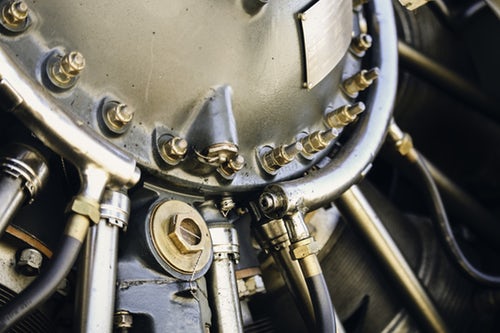This BSc (Hons) Mechanical Engineering degree will give you a strong foundation in a range of traditional mechanical engineering topics. It is accredited by the Institution of Mechanical Engineers(IMechE) and the Engineering Council, so the successful completion will give you the academic qualification required to gain Incorporated Engineer (IEng) status.
It’s a wide-ranging mechanical engineering degree that will develop your understanding of the field and your ability to solve engineering problems independently. You’ll study basic principles used by engineering professionals and how they work in practice and understand how what you learn in the classroom can be applied in real-life to find solutions to everyday problems.
Our accreditation from professional bodies ensures that what you learn relates directly to industry standards. The diverse nature of this Mechanical Engineering course means you could establish a career in many areas of industry, such as production, process and manufacturing engineering. It is the ideal course for engineers who want to broaden their career prospects beyond individual specialist or technical areas.
What you will study
Your studies will be underpinned by key engineering topics – maths, design and manufacture, mechanical science, thermofluids, professional engineering techniques and management systems. As you progress, you’ll be exposed to more specialist topics such as instrumentation and control, production processes, and sustainable engineering design.
In your final year, you’ll also undertake a dissertation project under the close supervision of a member of staff. Your chosen dissertation will give you the opportunity to manage a major project in an area of engineering that best suits your interests or career ambitions.
Year One: BSc Mechanical Engineering degree, full time
- Engineering Mathematics 1 – 20 credits
- Design and Manufacture – 20 credits
- Mechanical Science 1 – 20 credits
- Thermofluids 1 – 20 credits
- Professional Engineering Techniques – 20 credits
- Measurement Systems – 20 credits
Year Two: BSc Mechanical Engineering degree, full time
- Instrumentation and Control Systems – 20 credits
- Sustainable Engineering Design – 20 credits
- Mechanical Science 2 – 20 credits
- Thermofluids 2 – 20 credits
- Production Processes – 20 credits
- Fundamentals of Business Engineering and Management – 20 credits
Year Three: BSc Mechanical Engineering degree, full time
- Materials and Manufacture – 20 credits
- Operations Management – 20 credits
- Design and Analysis – 20 credits
- Control and Dynamics – 20 credits
- Individual Project (BSc) – 40 credits
- Supervised Work Experience (SWE) – 120 credits (optional)
Year One: BSc Mechanical Engineering Degree, part time
- Engineering Mathematics 1 – 20 credits
- Design and Manufacture – 20 credits
- Professional Engineering Techniques – 20 credits
Year Two: BSc Mechanical Engineering Degree, part time
- Mechanical Science 1 – 20 credits
- Measurement Systems – 20 credits
- Thermofluids 1 – 20 credits
Year Three: BSc Mechanical Engineering Degree, part time
- Mechanical Science 2 – 20 credits
- Thermofluids 2 – 20 credits
- Production Processes – 20 credits
Year Four: BSc Mechanical Engineering Degree, part time
- Instrumentation and Control Systems – 20 credits
- Sustainable Engineering Design – 20 credits
- Fundamentals of Business Engineering and Management – 20 credits
Year Five: BSc Mechanical Engineering Degree, part time
- Materials and Manufacture – 20 credits
- Operations Management – 20 credits
- Design and Analysis – 20 credits
Year Six: BSc Mechanical Engineering Degree, part time
- Control and Dynamics – 20 credits
- Individual Project (BSc) – 40 credits
- Supervised Work Experience (SWE) – 120 credits (optional)
Teaching
The mechanical engineering degree is taught by a team of tutors who promote an open door policy to students, so you will be able to get the best out of your studies in a supportive learning environment.
Our lecturers are experts in their subject areas, having worked in, or with, industry, conducting research, presenting at conferences, publishing their work, and informing your studies with the latest insights. Not only will you be taught by academics who are specialists in their fields, but you will also benefit from guest speakers from the engineering world.
You will learn through a combination of lectures, tutorials, practical sessions and seminars. This will be further consolidated by a series of practical exercises, design projects and where possible site visits. You’ll undertake open-ended tasks, applying concepts and key skills as you progress. You will also need to work independently doing research, keeping up-to-date with current issues and preparing for lectures.
We have excellent links with employers in Wales, the UK and beyond. Through regular consultation with practising professionals, we keep our mechanical engineering courses up-to-date with industry standards. Our strong links also mean you’ll have opportunities for site visits, industrial placements and, for students on sandwich courses, practitioner mentoring.
Zobacz więcej na stronie uniwersytetu >>
Wiza studencka do Wielkiej Brytanii
Aby studiować w Wielkiej Brytanii potrzebujesz wizy studenckiej. Aby złożyć wniosek o taką wizę studencką musisz zdjać certyfikat językowy na poziomie B2.
Uważaj! Do celów wizowych musisz wybrać wyłącznie egzamin w wesji Secure English Language Test (SELT) UKVI .
Co to jest test SELT UK VI registration? Przeczytaj więcej o testach SELT UKVI >>




















